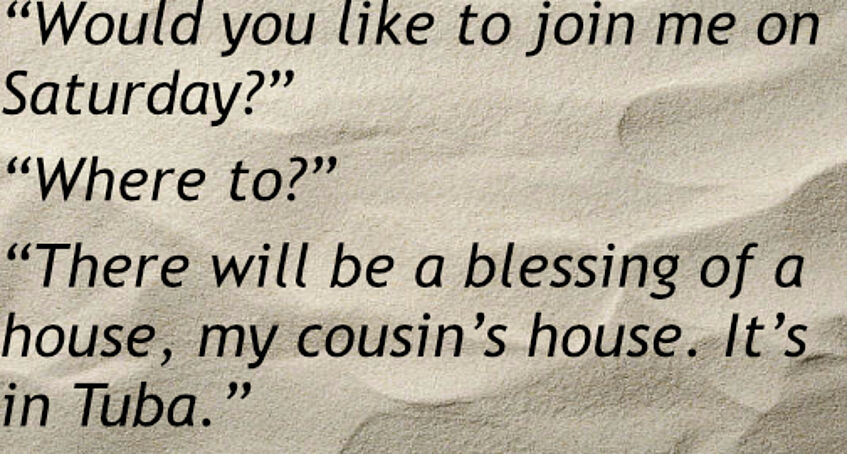Blessing the House in the Hot Harmattan Breeze

Blessing the House in the Hot Harmattan Breeze
Kirsten Rüther
Tuba, part of Accra right on the western fringes of the city, is located perhaps some 30 km from the centre, where Accra is merging quickly with former villages. Up until more recently – popular memory does not remember exactly – the land used to belong to chiefs. Then once they sat down, had their land surveyed and then sold it on 90-year lease contracts to families, some of which had lived in the area long before and others of which settled down as newcomers. Right now these occupiers of the land are busy on end erecting houses.
Tuba has electricity. The roads are as yet unpaved and dusty – especially at times like this, when I came to visit in March. Once the rains come in, the roads turn into huge mud pools, I was told. The water pipes do not reach all the houses yet. The house my host will bless has not yet been connected. Like all the houses around his cousin’s abode stands on wet ground. Tuba basically is too low for permanent building, but people go ahead with the construction anyway.
The house is waiting for us. Tables in front of it are covered with white table cloths. Each of it is carefully decorated with red and white plastic flowers. The chairs are adorned with colourful ribbons. They are fluttering gently in the hot Harmattan breeze, which is reaching out from the nearby sea.
Across the street there is a house in the process of being constructed. It is huge and typical of the way people build in Tuba. They start erecting houses early in their lives, when the children are still young and still arriving into the family. By the time the house will be finished the children will live elsewhere in town or have gone abroad. There is no tradition of taking in lodgers here. One just builds big.
Along the street people have started to erect little stalls from which they sell necessities. This is good for the dwellers in the area because they do not have to wait for any supermarket to be opened. In fact, the supermarket would kill many of the informal economic ventures placed along the road. Buying and selling stuff represents a mode of survival for almost any newcomer to the town. It is a way of getting started. You buy and sell anywhere: in the main roads, among cars, in bad fumes, at traffic lights and busy traffic checkpoints. Alternatively, you buy and sell in the emerging residential areas.
Next to the house imminently awaiting its blessing, separated by a narrow path allowing chickens to dance but most probably not two human beings to walk if holding themselves by the hands, there is a construction which consists of laid out foundations and hip-high walling. The place looks abandoned. It is overgrown by grass and weeds.
“Is that another house in the making?”
“We don’t know.”
“Sometimes people return.”
Inside the house which is to be blessed in a few minutes now, there is a beautiful ceiling with patterns. It is difficult to tell whether it is made of plastic or an iron sheet, but with this pattern it looks really nice. Carefully arranged curtains are blowing in the wind, and the most important guests are seated on the new furniture. The sitting room opens to a corridor from which a number of bedrooms and a kitchen can be reached. During the house blessing and even when the party is on afterwards, there will be no time to actually go through the rooms. Maybe I should just have asked and the owners would have taken me around.
This blessing is a Catholic ritual. Holy water is sprinkled onto all of us and into each of the rooms. The priest reads out the story of Emmaus. The house is pictured as a place of welcome for foreigners and guests. It is pictured as a place which represents the dreams of its owners. No wonder that the owner herself, a nurse, is really excited. She bought this land some fifteen years ago, waited five years before starting to erect the first structures. And now, finally, at the end of the day, it has been finished.
As soon as the holy ceremony has been set, the party starts outside. The guests of honour, mostly family and me, sit on the high table on the veranda. It is here that the first food is served – individual plates and dishes, while for the other guests the group catering starts hours later. The food is delicious. So is the beer. We all relax.
“Father, would you like another drink?”
“Yes, please – but only if it’s cold.”
“I’ll take it from the cooler’s box anyway.”
The wind comes from the Sahara and, very fortunately, the sea sends in a breeze. Outside the gate goats are passing by on the sandy road. Many neighbours seem not to be on their house-building projects. The women dance, with new-born babies on their backs. In the shade a young man is in control of the music which is loud and electronic.
It is wonderful to spend a hot Saturday like this.
September, 2018
